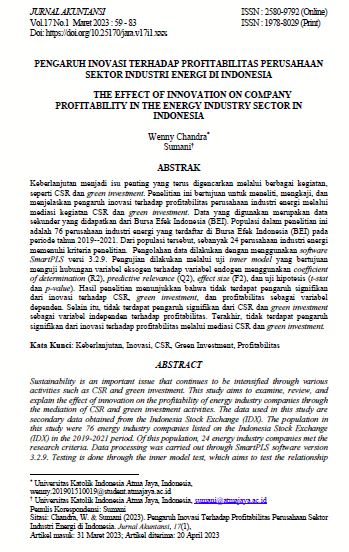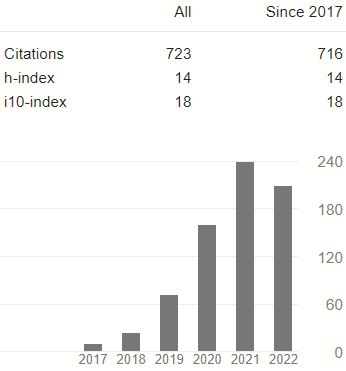PENGARUH INOVASI TERHADAP PROFITABILITAS PERUSAHAAN SEKTOR INDUSTRI ENERGI DI INDONESIA
DOI:
https://doi.org/10.25170/jak.v17i1.4331Keywords:
Keberlanjutan, Inovasi, CSR, Green Investment, ProfitabilitasAbstract
Sustainability is an important issue that continues to be intensified through various activities such as CSR and green investment. This study aims to examine, review, and explain the effect of innovation on the profitability of energy industry companies through the mediation of CSR and green investment activities. The data used in this study are secondary data obtained from the Indonesia Stock Exchange (IDX). The population in this study were 76 energy industry companies listed on the Indonesia Stock Exchange (IDX) in the 2019-2021 period. Of this population, 24 energy industry companies met the research criteria. Data processing was carried out through SmartPLS software version 3.2.9. Testing is done through the inner model test which aims to test the relationship between exogenous variables and endogenous variables using the coefficient of determination (R2), predictive relevance (Q2), effect size (F2), and hypothesis testing (t-stat and p-value). The results showed that there was no significant effect of innovation on CSR, green investment, and profitability as dependent variables. In addition, there is no significant effect of CSR and green investment as independent variables on profitability. Finally, there is no significant effect of innovation on profitability through the mediation of CSR and green investment.
References
Bockova, N., & Zizlavsky, O. (2016). The Innovation and Financial Performance of a Company: A Study from Czech Manufacturing Industry. Transformations in Business and Economics, 15, 156–175.
Brammer, S., Brooks, C., & Pavelin, S. (2006). Corporate Social Performance and Stock Returns: UK Evidence from Disaggregate Measures. Financial Management, 35(3), 97–116. https://doi.org/10.1111/J.1755-053X.2006.TB00149.X
Chariri, A., Bukit, G. R. S. B., Eklesia, O. B., Christi, B. U., & Tarigan, D. M. (2018). Does Green Investment Increase Financial Performance? Empirical Evidence from Indonesian Companies. E3S Web of Conferences, 31. https://doi.org/10.1051/E3SCONF/20183109001
Chen, Y., & Ma, Y. (2021). Does green investment improve energy firm performance? Energy Policy, 153, 112252. https://doi.org/10.1016/J.ENPOL.2021.112252
Chin, W. W. (1998). The Partial Least Squares Approach to Structural Equation Modeling (Vol. 2).
Choi, J. S., Kwak, Y. M., & Choe, C. (2010). Corporate social responsibility and corporate financial performance: Evidence from Korea: Http://Dx.Doi.Org/10.1177/0312896210384681, 35(3), 291–311. https://doi.org/10.1177/0312896210384681
Deegan, C. M. (2019). Legitimacy theory: Despite its enduring popularity and contribution, time is right for a necessary makeover. Accounting, Auditing and Accountability Journal, 32(8), 2307–2329. https://doi.org/10.1108/AAAJ-08-2018-3638
Eyraud, L., Clements, B., & Wane, A. (2013). Green investment: Trends and determinants. Energy Policy, 60, 852–865. https://doi.org/10.1016/J.ENPOL.2013.04.039
Fan, H., Graff, J. S., Kou, Z. Z., Liu, X., Wang, H., Graff Zivin, J. S., & Kou, Z. (2019). NBER WORKING PAPER SERIES GOING GREEN IN CHINA: FIRMS’ RESPONSES TO STRICTER ENVIRONMENTAL REGULATIONS. http://www.nber.org/papers/w26540
Fernández Fernández, Y., Fernández López, M. A., & Olmedillas Blanco, B. (2018). Innovation for sustainability: The impact of R&D spending on CO2 emissions. Journal of Cleaner Production, 172, 3459–3467. https://doi.org/10.1016/J.JCLEPRO.2017.11.001
Freeman, R. E., Dmytriyev, S. D., & Phillips, R. A. (2021). Stakeholder Theory and the Resource-Based View of the Firm. Journal of Management, 47(7), 1757–1770. https://doi.org/10.1177/0149206321993576
Hair, J. F. , H. G. T. M. , R. C. M. , & S. M. (2017). A primer on partial least squares structural equation modeling (PLS-SEM). CA : Sage.
Hart, S., & Ahuja, G. (1996). DOES IT PAY TO BE GREEN? AN EMPIRICAL EXAMINATION OF THE RELATIONSHIP BETWEEN EMISSION REDUCTION AND FIRM PERFORMANCE. Undefined. https://doi.org/10.1002/(SICI)1099-0836(199603)5:1
Indriastuti, M., & Chariri, A. (2021). The role of green investment and corporate social responsibility investment on sustainable performance. Http://Www.Editorialmanager.Com/Cogentbusiness, 8(1). https://doi.org/10.1080/23311975.2021.1960120
Khalil, M. A., Khalil, R., & Khalil, M. K. (2022). Environmental, social and governance (ESG) - augmented investments in innovation and firms’ value: a fixed-effects panel regression of Asian economies. China Finance Review International. https://doi.org/10.1108/CFRI-05-2022-0067
Lee, C. L., & Wu, H. C. (2016). How do slack resources affect the relationship between R&D expenditures and firm performance? R and D Management, 46, 958–978. https://doi.org/10.1111/RADM.12141
Lee, C. Y., Chang, W. C., & Lee, H. C. (2017). An investigation of the effects of corporate social responsibility on corporate reputation and customer loyalty - Evidence from the Taiwan non-life insurance industry. Social Responsibility Journal, 13(2), 355–369. https://doi.org/10.1108/SRJ-01-2016-0006
Lee, K.-H., & Min, B. (2015). Green R&D for eco-innovation and its impact on carbon emissions and firm performance. Journal of Cleaner Production, 108, 534–542. https://doi.org/https://doi.org/10.1016/j.jclepro.2015.05.114
Li, D., Zheng, M., Cao, C., Chen, X., Ren, S., & Huang, M. (2017). The impact of legitimacy pressure and corporate profitability on green innovation: Evidence from China top 100. Journal of Cleaner Production, 141, 41–49. https://doi.org/10.1016/J.JCLEPRO.2016.08.123
Li, W., Chien, F., Hsu, C. C., Zhang, Y. Q., Nawaz, M. A., Iqbal, S., & Mohsin, M. (2021). Nexus between energy poverty and energy efficiency: Estimating the long-run dynamics. Resources Policy, 72. https://doi.org/10.1016/j.resourpol.2021.102063
Lu, H., Oh, W.-Y., Kleffner, A., & Chang, Y. K. (2021). How do investors value corporate social responsibility? Market valuation and the firm specific contexts. Journal of Business Research, 125, 14–25. https://doi.org/10.1016/j.jbusres.2020.11.063
Luque, A., & Herrero-García, N. (2019). How corporate social (ir)responsibility in the textile sector is defined, and its impact on ethical sustainability: An analysis of 133 concepts. Corporate Social Responsibility and Environmental Management, 26(6), 1285–1306.
https://doi.org/10.1002/CSR.1747
Ma, J. Z., Huang, H. Y., Zhu, Q., & Shen, X. (2022). Corporate Social Responsibility Disclosure, Market Supervision, and Green Investment. Emerging Markets Finance and Trade. https://doi.org/10.1080/1540496X.2022.2082868
Menzel, V., Smagin, J., & David, F. (2010). Can companies profit from greener manufacturing? Measuring Business Excellence, 14(2), 22–31. https://doi.org/10.1108/13683041011047830
Mithani, M. A. (2017). Innovation and CSR — Do They Go Well Together? Long Range Planning, 50(6), 699–711. https://doi.org/10.1016/J.LRP.2016.08.002
Nelling, E., & Webb, E. (2009). Corporate social responsibility and financial performance: The “virtuous circle” revisited. Review of Quantitative Finance and Accounting, 32(2), 197–209. https://doi.org/10.1007/S11156-008-0090-Y
Newell, G., & Lee, C. L. (2012). Influence of the corporate social responsibility factors and financial factors on REIT performance in Australia. Journal of Property Investment and Finance, 30(4), 389–403. https://doi.org/10.1108/14635781211241789
Oyewumi, O. R., Ogunmeru, O. A., & Oboh, C. S. (2018). Investment in corporate social responsibility, disclosure practices, and financial performance of banks in Nigeria. Future Business Journal, 4(2), 195–205. https://doi.org/10.1016/J.FBJ.2018.06.004
Qiu, L. D., Zhou, M., & Wei, X. (2018). Regulation, innovation, and firm selection: The porter hypothesis under monopolistic competition. Journal of Environmental Economics and Management, 92, 638–658. https://doi.org/10.1016/J.JEEM.2017.08.012
Ratajczak, P., & Szutowski, D. (2016). Exploring the relationship between CSR and innovation. Sustainability Accounting, Management and Policy Journal, 7(2), 295–318. https://doi.org/10.1108/SAMPJ-07-2015-0058
Razzaq, A., An, H., & Delpachitra, S. (2021). Does technology gap increase FDI spillovers on productivity growth? Evidence from Chinese outward FDI in Belt and Road host countries. Technological Forecasting and Social Change, 172. https://doi.org/10.1016/J.TECHFORE.2021.121050
Ross, S., Ross, & Stephen. (1977). The Determination of Financial Structure: The Incentive-Signalling Approach. Bell Journal of Economics, 8(1), 23–40. https://EconPapers.repec.org/RePEc:rje:bellje:v:8:y:1977:i:spring:p:23-40
Saufi, N. A. A., Daud, S., & Hassan, H. (2016). Green Growth and Corporate Sustainability Performance. Procedia Economics and Finance, 35, 374–378. https://doi.org/10.1016/S2212-5671(16)00046-0
Siedschlag, I., & Yan, W. (2021). Firms’ green investments: What factors matter? Journal of Cleaner Production, 310, 127554. https://doi.org/10.1016/J.JCLEPRO.2021.127554
Tsai, H., Tsang, N. K. F., & Cheng, S. K. Y. (2012). Hotel employees’ perceptions on corporate social responsibility: The case of Hong Kong. International Journal of Hospitality Management, 31(4), 1143–1154. https://doi.org/10.1016/J.IJHM.2012.02.002
Wang, K., Zhang, H. M., Tsai, S. B., Wu, L. D., Xue, K. K., Fan, H. J., Zhou, J., & Chen, Q. (2018). Does a Board Chairman’s Political Connection Affect Green Investment?—From a Sustainable Perspective. Sustainability 2018, Vol. 10, Page 582, 10(3), 582. https://doi.org/10.3390/SU10030582
Weche, J. P. (2019). Does green corporate investment crowd out other business investment? Industrial and Corporate Change, 28(5), 1279–1295. https://doi.org/10.1093/ICC/DTY056
Xue, Y., Jiang, C., Guo, Y., Liu, J., Wu, H., & Hao, Y. (2022). Corporate Social Responsibility and High-quality Development: Do Green Innovation, Environmental Investment and Corporate Governance Matter? Emerging Markets Finance and Trade, 58(11), 3191–3214. https://doi.org/10.1080/1540496X.2022.2034616
Yang, X., He, L., Xia, Y., & Chen, Y. (2019). Effect of government subsidies on renewable energy investments: The threshold effect. Energy Policy, 132, 156–166. https://doi.org/10.1016/J.ENPOL.2019.05.039
Yu, Y., & Huo, B. (2019). The impact of environmental orientation on supplier green management and financial performance: The moderating role of relational capital. Journal of Cleaner Production, 211, 628–639. https://doi.org/10.1016/j.jclepro.2018.11.198
Zeidan, R. (2020). Obstacles to sustainable finance and the covid19 crisis. Https://Doi.Org/10.1080/20430795.2020.1783152. https://doi.org/10.1080/20430795.2020.1783152
Zhang, D., Rong, Z., & Ji, Q. (2019). Green innovation and firm performance: Evidence from listed companies in China. Resources, Conservation and Recycling, 144, 48–55. https://doi.org/10.1016/J.RESCONREC.2019.01.023

Downloads
Published
Issue
Section
License
Copyright (c) 2023 Wenny Chandra, Sumani Sumani

This work is licensed under a Creative Commons Attribution-ShareAlike 4.0 International License.
Authors who publish with this journal agree to the following terms:
- Authors retain copyright and grant the journal right of first publication with the work simultaneously licensed under a Creative Commons Attribution-ShareAlike 4.0 International License that allows others to share the work with an acknowledgment of the work's authorship and initial publication in this journal.
- Authors are able to enter into separate, additional contractual arrangements for the non-exclusive distribution of the journal's published version of the work (e.g., post it to an institutional repository or publish it in a book), with an acknowledgment of its initial publication in this journal.
- Authors are permitted and encouraged to post their work online (e.g., in institutional repositories or on their website) prior to and during the submission process, as it can lead to productive exchanges, as well as earlier and greater citation of published work.














